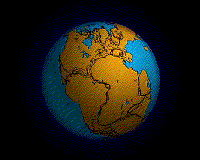Nature
Nature encompasses all physical phenomena in the universe outside of artificial human creations. It is the phenomena of the physical world collectively, including plants, animals, the landscape, and other features and products of the earth, as opposed to humans or human creations. The study of nature is a large part of science, especially in branches such as biology, geology, and ecology, which focus on understanding the laws and structures that govern the natural world.
Overview[edit | edit source]
Nature, in its broadest sense, is equivalent to the natural world, physical world, or material world. "Nature" refers to the phenomena of the physical world, and also to life in general. It ranges in scale from the subatomic to the cosmic.
The word nature is derived from the Latin word natura, meaning "birth" or "character" (being in nature). In ancient times, nature was basically everything that was not made by man. Philosophically, nature is often referred to as the essence of the universe, the one source of all that exists.
Natural Environment[edit | edit source]
The natural environment encompasses all living and non-living things occurring naturally on Earth. It is an environment that has not been significantly altered by human activity and includes forests, rivers, mountains, oceans, and deserts. The conservation of the natural environment is a vital part of sustaining humanity, with efforts aimed at preserving biodiversity, protecting endangered species, and managing natural resources.
Human Interaction with Nature[edit | edit source]
Humans interact with nature in numerous ways. They depend on it for resources such as water, food, and shelter, but also have the capacity to alter it through activities like agriculture, urbanization, and industrialization. This interaction has led to significant environmental issues, including pollution, deforestation, and climate change, which pose threats to the natural balance and the survival of life on Earth.
Nature in Culture[edit | edit source]
Nature has been a source of inspiration for art, literature, and religion throughout human history. It plays a central role in many cultural practices and philosophical concepts. The appreciation of natural beauty, expressed in gardens and landscape design, reflects the deep human connection to nature.
Conservation[edit | edit source]
Conservation efforts aim to protect natural habitats and preserve the diversity of life. This includes establishing protected areas such as national parks and wildlife reserves, enforcing laws that limit pollution and land degradation, and promoting sustainable practices that ensure the well-being of the natural world for future generations.
See Also[edit | edit source]
| This article is a stub. You can help WikiMD by registering to expand it. |
Transform your life with W8MD's budget GLP1 injections from $125
W8MD offers a medical weight loss program NYC and a clinic to lose weight in Philadelphia. Our W8MD's physician supervised medical weight loss centers in NYC provides expert medical guidance, and offers telemedicine options for convenience.
Why choose W8MD?
- Comprehensive care with FDA-approved weight loss medications including:
- loss injections in NYC both generic and brand names:
- weight loss medications including Phentermine, Qsymia, Diethylpropion etc.
- Accept most insurances for visits or discounted self pay cost.
- Generic weight loss injections starting from just $125.00 for the starting dose
- In person weight loss NYC and telemedicine medical weight loss options in New York city available
- Budget GLP1 weight loss injections in NYC starting from $125.00 biweekly with insurance!
Book Your Appointment
Start your NYC weight loss journey today at our NYC medical weight loss, and Philadelphia medical weight loss Call (718)946-5500 for NY and 215 676 2334 for PA
Search WikiMD
Ad.Tired of being Overweight? Try W8MD's NYC physician weight loss.
Semaglutide (Ozempic / Wegovy and Tirzepatide (Mounjaro / Zepbound) available. Call 718 946 5500.
Advertise on WikiMD
|
WikiMD's Wellness Encyclopedia |
| Let Food Be Thy Medicine Medicine Thy Food - Hippocrates |
Translate this page: - East Asian
中文,
日本,
한국어,
South Asian
हिन्दी,
தமிழ்,
తెలుగు,
Urdu,
ಕನ್ನಡ,
Southeast Asian
Indonesian,
Vietnamese,
Thai,
မြန်မာဘာသာ,
বাংলা
European
español,
Deutsch,
français,
Greek,
português do Brasil,
polski,
română,
русский,
Nederlands,
norsk,
svenska,
suomi,
Italian
Middle Eastern & African
عربى,
Turkish,
Persian,
Hebrew,
Afrikaans,
isiZulu,
Kiswahili,
Other
Bulgarian,
Hungarian,
Czech,
Swedish,
മലയാളം,
मराठी,
ਪੰਜਾਬੀ,
ગુજરાતી,
Portuguese,
Ukrainian
Medical Disclaimer: WikiMD is not a substitute for professional medical advice. The information on WikiMD is provided as an information resource only, may be incorrect, outdated or misleading, and is not to be used or relied on for any diagnostic or treatment purposes. Please consult your health care provider before making any healthcare decisions or for guidance about a specific medical condition. WikiMD expressly disclaims responsibility, and shall have no liability, for any damages, loss, injury, or liability whatsoever suffered as a result of your reliance on the information contained in this site. By visiting this site you agree to the foregoing terms and conditions, which may from time to time be changed or supplemented by WikiMD. If you do not agree to the foregoing terms and conditions, you should not enter or use this site. See full disclaimer.
Credits:Most images are courtesy of Wikimedia commons, and templates, categories Wikipedia, licensed under CC BY SA or similar.
Contributors: Prab R. Tumpati, MD



















